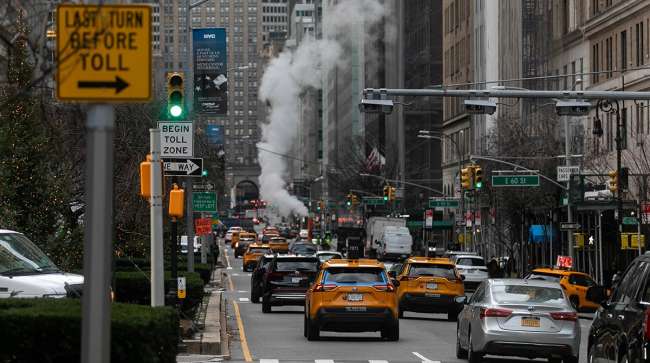E-ZPass readers and license plate-scanning cameras over Park Avenue in New York in January. (Michael Nagle/Bloomberg)
New York City’s congestion pricing program is likely to remain in place at least for the next several months while legal wrangling between state officials and the Trump administration continues.
The jointly submitted timeline, proposed in a court filing April 4, comes after President Donald Trump and his transportation secretary threatened in February to end the tolling initiative. If a Manhattan federal judge agrees to that plan, officials from various agencies will present their arguments in back-and-forth filings under a series of deadlines that could run until October or beyond. The toll would stay in effect during that period.
The federal government has indicated that for now it doesn’t intend to seek a pause on the toll as the legal case continues, and the state has said it will continue to operate the program unless it gets a court order forcing it to shut it down, according to the filing. But it’s still possible that either side, or other interested parties, could seek a faster ruling on the fate of the controversial program.
The program, which charges most drivers a $9 toll to enter Manhattan between 60th Street and its southern tip, aims to reduce traffic and pollution while raising money for the city’s subways, buses and commuter rails, run by the Metropolitan Transportation Authority. The MTA, which implements the toll, anticipates the program will bring in $500 million a year, after expenses, and says it raised $100 million in the first two months of this year.
Congestion pricing set to continue at least until October, legal filing shows https://t.co/nSr3X3Gw0i
— Crain’s New York (@CrainsNewYork) April 8, 2025
The new toll has decreased traffic in the tolling zone. About 12% fewer vehicles entered the area in March, according to the MTA.
The plan has drawn criticism for its financial hit to working people and is the target of separate lawsuits by New Jersey — which claims the plan has just shifted congestion and pollution to the Garden State — and various groups representing suburban commuters, truckers and other opponents.
Support for the program among those who live in the city has increased since tolling started in January. About 42% say the toll should continue, while 35% want it eliminated, according to a Siena College poll released March 10. In December, only 32% were in favor of the toll, and 56% were against it.
Transportation Secretary Sean Duffy said in mid-February that the Federal Highway Administration planned to withdraw an agreement with the state-run MTA that allowed the agency to begin imposing tolls on drivers entering some of Manhattan’s busiest streets.
That pushed the MTA to launch its lawsuit against the Trump administration, contending that efforts to stop the program are unlawful after it was already approved and implemented. The federal government had initially given the state until March 21 to stop the program but later extended that date to April 20.
The MTA declined to comment on the filing beyond its contents. A representative of the U.S. Department of Transportation didn’t respond to a request for comment.
The two sides are scheduled to appear for a conference on the case April 9.
The case is Metropolitan Transportation Authority v. Duffy, 25-cv-1413, US District Court, Southern District of New York (Manhattan).






